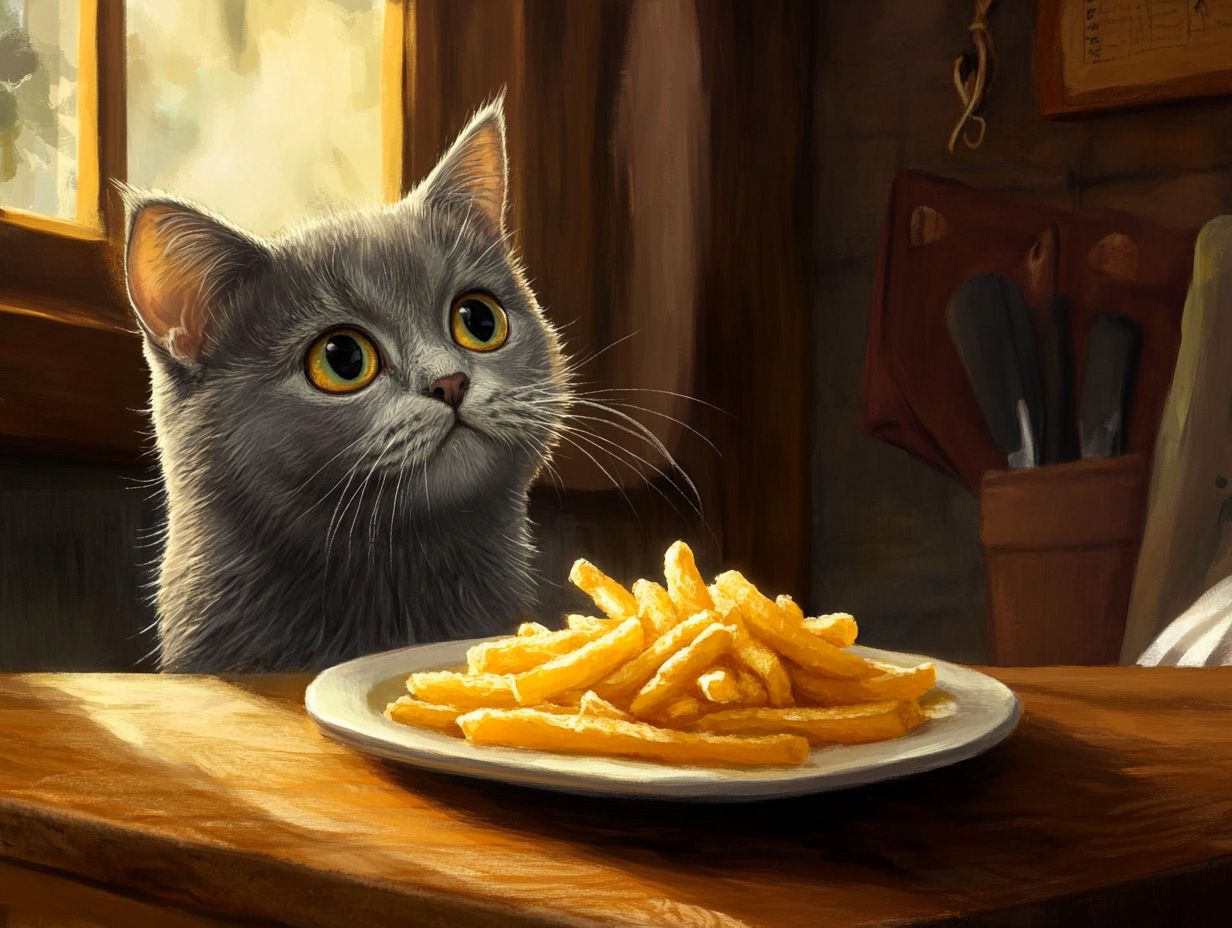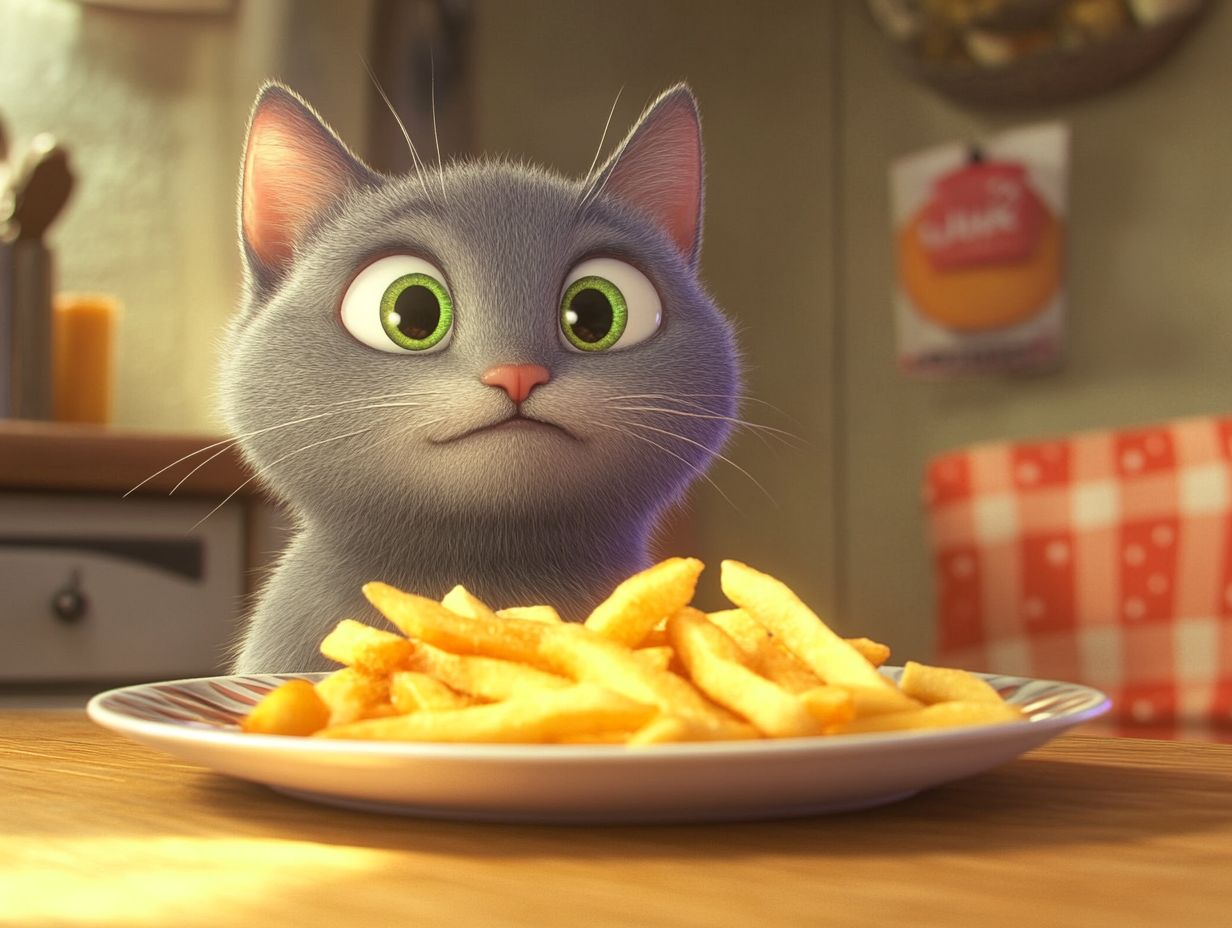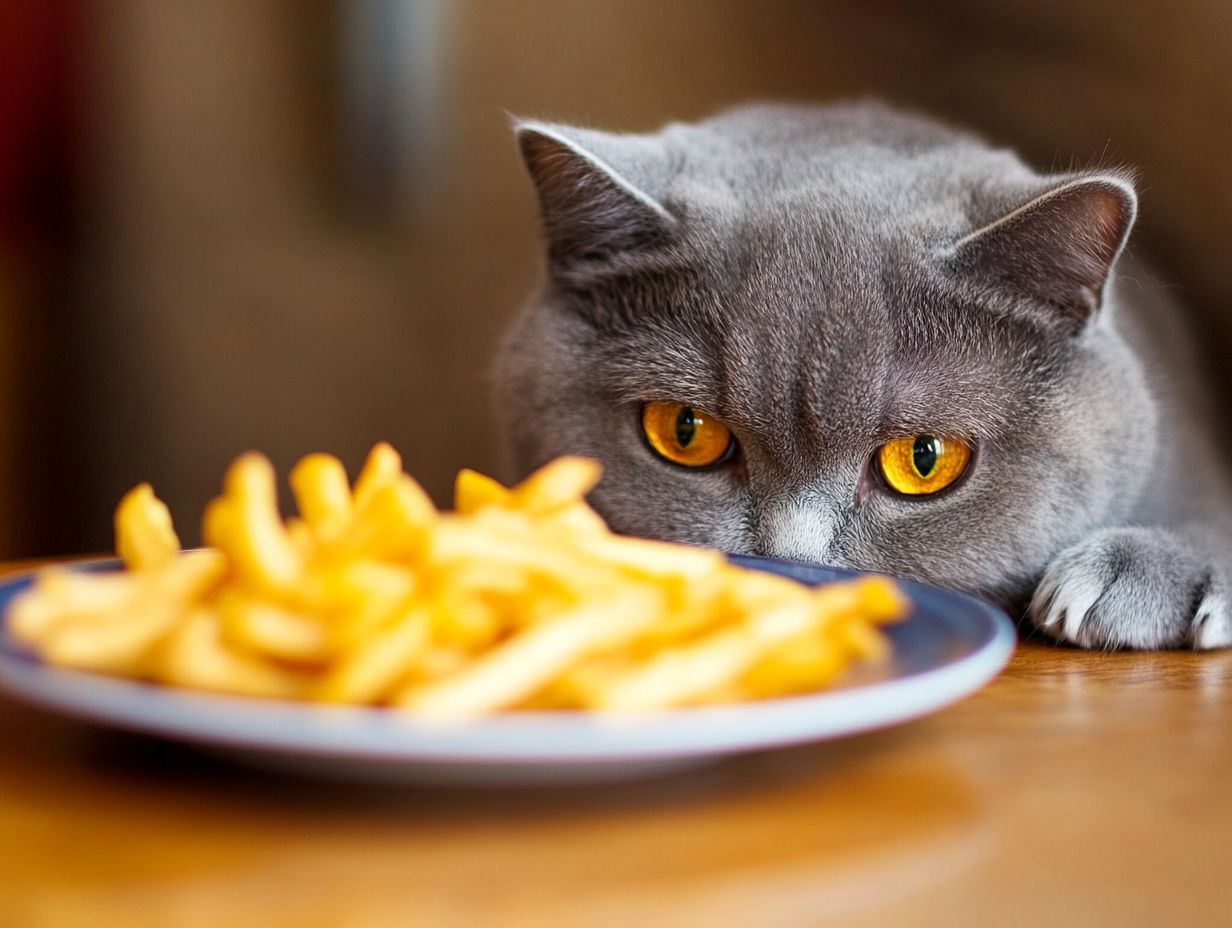While it might be tempting to share your French fries with your furry friend, this common snack poses unexpected dangers for cats. Always choose treats specifically formulated for cats. Feeding cats French fries can lead to serious health risks due to high fat and salt content, without any nutritional benefit. This article explores why French fries—both raw and cooked—can be harmful and highlights other human foods that should be avoided.
You’ll learn how to recognize signs of poisoning, discover safe treat alternatives, and get tips on keeping your cat away from harmful snacks. Your cat’s health is worth it—read on to find out more!
Key Takeaways:

- Feeding cats French fries can be dangerous due to high fat and salt content, without any nutritional benefit.
- Other human foods toxic to cats include grapes, onions, and chocolate.
- If your cat shows any signs of poisoning, contact your veterinarian immediately for guidance.
The Dangers of Feeding Cats French Fries
Feeding cats French fries poses serious health risks due to their high fat content, lack of nutritional benefits, and potential to cause gastrointestinal upset. Cats need a meat-based diet, and French fries often contain unhealthy oils and harmful seasonings.
Responsible pet ownership dictates that table scraps should not be given to cats. Such practices can negatively affect a cat’s health, contributing to obesity or diabetes over time.
Why French Fries are Harmful to Cats
French fries can be harmful because they are often made from raw potatoes that contain solanine, a toxic alkaloid found in the green parts of potatoes. This compound can lead to gastrointestinal distress, neurological issues, and, in severe cases, organ failure.
Additionally, many fast-food establishments add seasonings such as garlic and onion powder, which are toxic to cats. Garlic can cause hemolytic anemia, while onion can damage red blood cells, potentially leading to lethargy and weakness. For more information, check out this article on whether cats can eat French fries.
Given their sensitive digestive systems, these harmful ingredients pose a significant risk to your cat’s health.
Other Human Foods to Avoid Feeding Cats
Many human foods can disturb the sensitive digestive systems of cats and lack essential vitamins and minerals needed for a healthy diet. Common toxic foods for cats include garlic, onions, raw potatoes, chocolate, avocados, and caffeine. These items should never be shared.
List of Foods That Can Be Toxic to Cats

Certain foods are highly toxic to cats, including chocolate, caffeine, alcohol, raw fish, grapes, raisins, and mushrooms. These items can cause severe toxicity and significant health risks.
Signs of Poisoning in Cats
Cats that have been poisoned may exhibit symptoms like vomiting, diarrhea, lethargy, and, in severe cases, seizures. Recognizing these signs is essential for timely treatment.
What to Do If You Suspect Poisoning
If a cat shows signs of poisoning, such as vomiting or unusual behavior, take immediate action. Get the cat to a veterinarian to prevent further complications. Keep the cat calm and place it in a safe area away from potential toxins. If you suspect ingestion of something harmful, try to identify the substance by locating any containers or labels, as this information will be valuable for the veterinarian.
Healthy and Safe Treat Alternatives
If you want to share food with your cat, opt for small amounts of plain cooked chicken or turkey instead of human snacks. Healthy alternative treats for cats consist of specially formulated cat food and specific fruits and vegetables that are safe for feline consumption.
For example, small amounts of cooked carrots or peas provide vitamins and fiber. Products like the Hepper NomNom Cat Bowl can help manage portion sizes and maintain a balanced diet. When offering treats like cooked chicken or fish, aim for small portions—about 1-2 teaspoons is safe. Remember, any amount of French fries is too much.
How to Prevent Your Cat from Eating Human Foods
Preventing your cat from eating human foods involves training and creating a safe environment. Consider using baby gates or keeping doors closed to prevent access to kitchens and dining areas. Companies like PangoVet provide comprehensive pet care solutions that emphasize safe feeding practices.
Utilizing clicker training can discourage unwanted behavior, teaching the pet what is unsafe. Providing enrichment through toys and activities can keep your cat occupied and reduce their interest in human food. For more information on safe practices, read our article Can Cats Eat French Fries? Why You Should Avoid Them.
Frequently Asked Questions
Can Cats Eat French Fries?

It is not recommended for cats to eat French fries. While they may enjoy the taste, it is not a healthy or appropriate food for cats.
Why Should You Avoid Feeding French Fries to Cats?
French fries are high in fat, sodium, and carbohydrates, which are not beneficial for a cat’s diet. They can lead to obesity, diabetes, and other health issues in cats. For more information, visit Cornell University College of Veterinary Medicine.
What Are the Risks of Feeding French Fries to Cats?
Feeding French fries to cats can result in digestive issues such as vomiting and diarrhea. In severe cases, it can lead to pancreatitis, a potentially life-threatening condition. Refer to ASPCA for more details.
What Are Some Alternatives to French Fries for Cats?
Cats can enjoy a variety of healthy snacks such as cooked chicken or fish, and small pieces of fruits and vegetables. These options are more suitable for their diet and won’t cause harm.
In conclusion, always prioritize your cat’s health by providing safe and suitable food options, ensuring you are informed about harmful foods, and employing training methods to discourage unwanted behaviors.